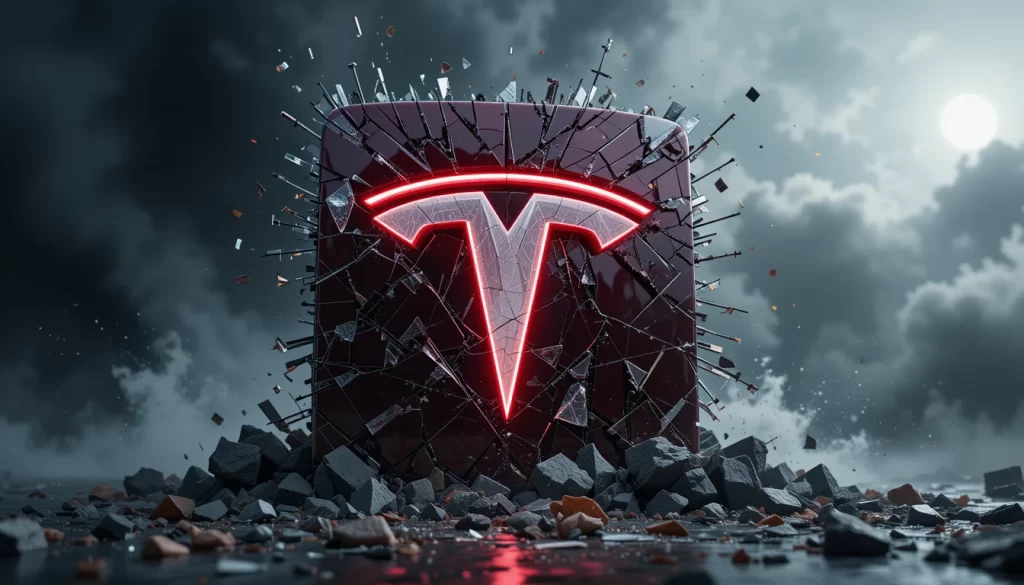Tesla’s recent market decline has stirred headlines, but the deeper message lies in what it reveals about the modern business landscape: in the age of decentralization and transparency, reputation is more valuable than capital. The contrast between Tesla’s dramatic downturn and the rise of Graphite Network brings this lesson into sharp focus.
Tesla’s Collapse: A Crisis of Trust
In early 2025, Tesla lost nearly $800 billion in market value, wiping out years of growth and sending shockwaves through the global market. The company’s sales in Europe dropped by 22% year-over-year—a major hit in one of its key markets. And while external economic pressures certainly play a role, the tipping point seems to stem from the personal actions of its CEO, Elon Musk.
Musk’s growing involvement in political circles—specifically his collaboration with Donald Trump’s Department of Government Efficiency (DOGE) and public praise for controversial far-right figures—sparked consumer backlash. The fallout has been swift and visible:
- European backlash: Major markets like Germany and France saw a surge in demand for Tesla competitors like BYD and Volkswagen, while Tesla’s brand lost favor due to its perceived alignment with political extremism.
- Shareholder concerns: Institutional investors grew wary of Musk’s unpredictable public behavior and its impact on Tesla’s long-term brand value.
- Retail exodus: Customers began canceling orders or looking to EV alternatives, citing ethical concerns and disappointment in the brand’s direction.
As a result, Tesla’s shares dropped more than 40% since January, as covered by outlets such as CNN and The Guardian.
Enter Graphite Network: Trust by Design
While Tesla struggles with the consequences of reputational damage, Graphite Network, a new Web3 platform, is thriving by placing trust and reputation at the core of its infrastructure.
Graphite is built around the concept that identity and credibility are more valuable in decentralized environments than mere access to capital. Here’s how it works:
- Reputation scores: Every user is assigned a dynamic reputation score based on their on-chain behavior, engagement quality, and network interactions.
- Transparent credentials: Participants must build and maintain their credibility over time, which is publicly visible and immutable.
- Peer-based accountability: Trust isn’t earned through wealth or status—but through consistent, transparent, and verifiable actions.
This system ensures that participants—whether developers, investors, or content creators—can engage in the Graphite ecosystem based on merit and behavior, not just resources. It’s a vision of a trust-first Web3 future.
The Bigger Picture: Reputation Is the Real Asset
Tesla’s fall and Graphite’s rise offer two contrasting narratives in today’s digital economy:
| Aspect | Tesla | Graphite Network |
| Focus | Capital, technology | Trust, reputation |
| Trigger of Decline/Growth | Public backlash over leadership behavior | Adoption driven by transparent reputation systems |
| Governance | Centralized, tied to individual | Decentralized, community-verified |
| Key Weakness | Brand risk from CEO controversies | Relies on user credibility, reducing systemic risk |
This shift isn’t just about crypto or EVs—it’s about the changing values of a digital-native society, where transparency, accountability, and ethical alignment are crucial for long-term value creation.
Conclusion: A Turning Point for Businesses and Blockchain
As companies face increasing scrutiny from digitally connected communities, reputation has emerged as a non-negotiable asset. Tesla’s recent struggles show what happens when a brand’s public perception fractures. In contrast, Graphite Network is building a future where trust is quantifiable, decentralized, and rewarded.In the age of Web3 and ethical investing, capital might build companies—but only reputation sustains them.
